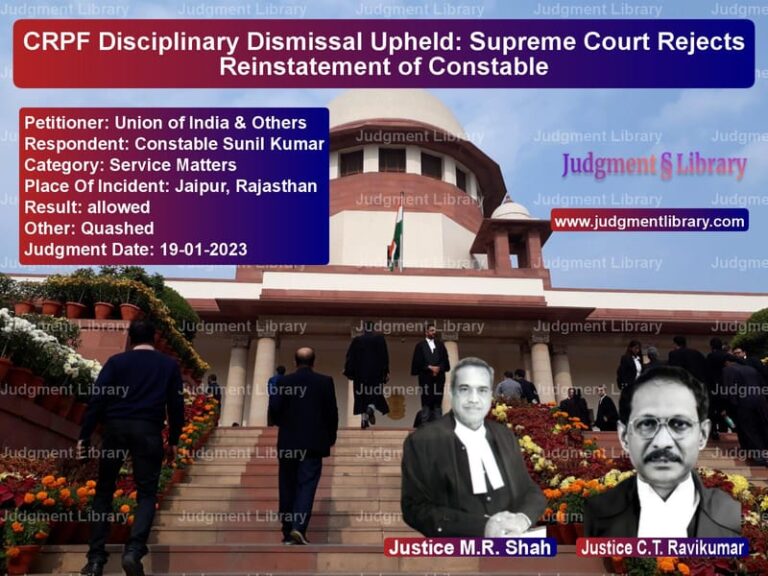Partition Suit and Hindu Succession Act: Supreme Court’s Landmark Ruling
The Supreme Court of India has delivered a significant ruling in the partition suit involving the inheritance of ancestral property under the Hindu Succession (Tamil Nadu Amendment) Act, 1989. The case, involving R. Mahalakshmi as the appellant and A. Kanchana and others as the respondents, clarifies the inheritance rights of daughters and the legal validity of partial partition suits.
Background of the Case
The dispute arose when Sri A. V. Venkataraman filed a suit (O.S. No. 666 of 2001) seeking the partition of an ancestral property inherited by his father under a registered partition deed dated April 27, 1954. He claimed a share of 6/20, with his sisters (Defendants No. 1 to 3) also entitled to shares under the Hindu Succession Act.
The case revolved around the amendment made in 1989 to the Hindu Succession Act, which granted daughters equal coparcenary rights. The legal question was whether the daughters’ inheritance rights were affected by their marital status at the time of amendment.
Initial Judgment by the Trial Court
The Additional Subordinate Judge, Chengalpattu, passed a decree on July 27, 2004, granting:
- 6/20 share each to the Plaintiff, Second Defendant, and Fourth Defendant.
- 1/20 share each to the First and Third Defendants.
The Appellant, however, challenged this ruling, arguing that the suit failed to include all inherited properties, making it a case of partial partition.
Appeal and High Court Proceedings
The case was taken to the High Court after the Principal District Judge upheld the Trial Court’s ruling. The High Court dismissed the appeal, leading the Appellant to approach the Supreme Court.
Supreme Court’s First Intervention
The Supreme Court, in Civil Appeal No. 5053 of 2009, ruled in favor of the Appellant, noting that all inherited properties were not included in the partition suit. The matter was remanded to the Trial Court for reconsideration.
Further Legal Developments
Upon reevaluation, the Trial Court modified its decision in 2010, granting the Appellant a 1/4 share in the suit property, while the remaining 3/4 share was given to the Plaintiff. However, the matter was further appealed, and the Principal District Judge remanded it again, finding non-compliance with the Supreme Court’s earlier directives.
The High Court later overturned the decision, awarding:
- 5/8 share to the Plaintiffs jointly.
- 1/8 share each to Defendants 1, 3, and 4.
Challenging this, the Appellant once again approached the Supreme Court.
Arguments Presented Before the Supreme Court
The Appellant, appearing in person, contended:
- The High Court erred in holding that the Supreme Court had not directed the inclusion of all inherited properties.
- The High Court wrongly interpreted the remand order, allowing the case to be decided based only on amended pleadings.
- The final decision reducing the Appellant’s share to 1/8 was erroneous.
On the other hand, the Respondents, represented by Mr. V.M. Venkatramana, argued:
- There were no additional properties available for partition apart from those listed in the original suit.
- Two plots of land acquired under the Land Acquisition Act in 1956 were not part of the inheritance.
- The High Court’s ruling was legally sound and should be upheld.
Supreme Court’s Final Judgment
The Supreme Court, after reviewing all arguments, observed:
“As we have held that the High Court misinterpreted the judgment of this Court in Civil Appeal No. 5053 of 2009, we set aside the judgment of the High Court and uphold the judgment of the First Appellate Court.”
The Court emphasized that the Appellate Court was correct in remanding the case for the inclusion of all inherited properties, as per the 1954 partition deed.
The Supreme Court further ruled:
“The High Court committed an error in holding that there was no direction given by this Court for including the other properties in the suit schedule.”
The Court directed the Trial Court to reconsider the case strictly in compliance with the 2009 judgment and decide expeditiously.
Implications of the Judgment
The ruling has far-reaching implications:
- It reaffirms that all inherited properties must be included in a partition suit.
- Daughters have equal rights as sons under the Hindu Succession (Tamil Nadu Amendment) Act, 1989.
- The validity of partial partition suits is questioned when all properties are not considered.
Conclusion
The Supreme Court’s decision ensures that partition suits adhere to principles of fairness and completeness. By reinforcing the inheritance rights of daughters and preventing selective property inclusion, the judgment strengthens property succession laws in India.
Don’t miss out on the full details! Download the complete judgment in PDF format below and gain valuable insights instantly!
Download Judgment: R. Mahalakshmi vs A. Kanchana and Othe Supreme Court of India Judgment Dated 15-09-2016-1741883778323.pdf
Direct Downlaod Judgment: Direct downlaod this Judgment
See all petitions in Property Disputes
See all petitions in Succession and Wills
See all petitions in Judgment by Anil R. Dave
See all petitions in Judgment by L. Nageswara Rao
See all petitions in allowed
See all petitions in supreme court of India judgments September 2016
See all petitions in 2016 judgments
See all posts in Civil Cases Category
See all allowed petitions in Civil Cases Category
See all Dismissed petitions in Civil Cases Category
See all partially allowed petitions in Civil Cases Category







